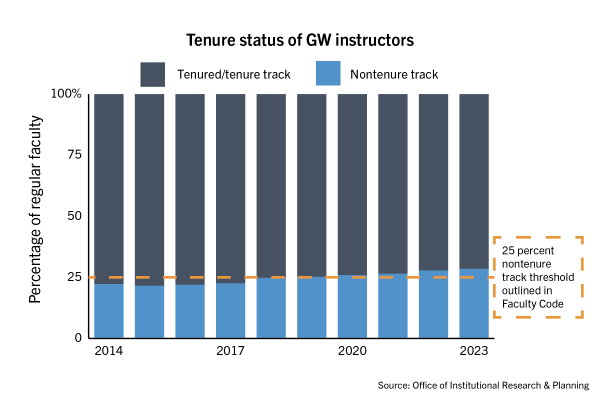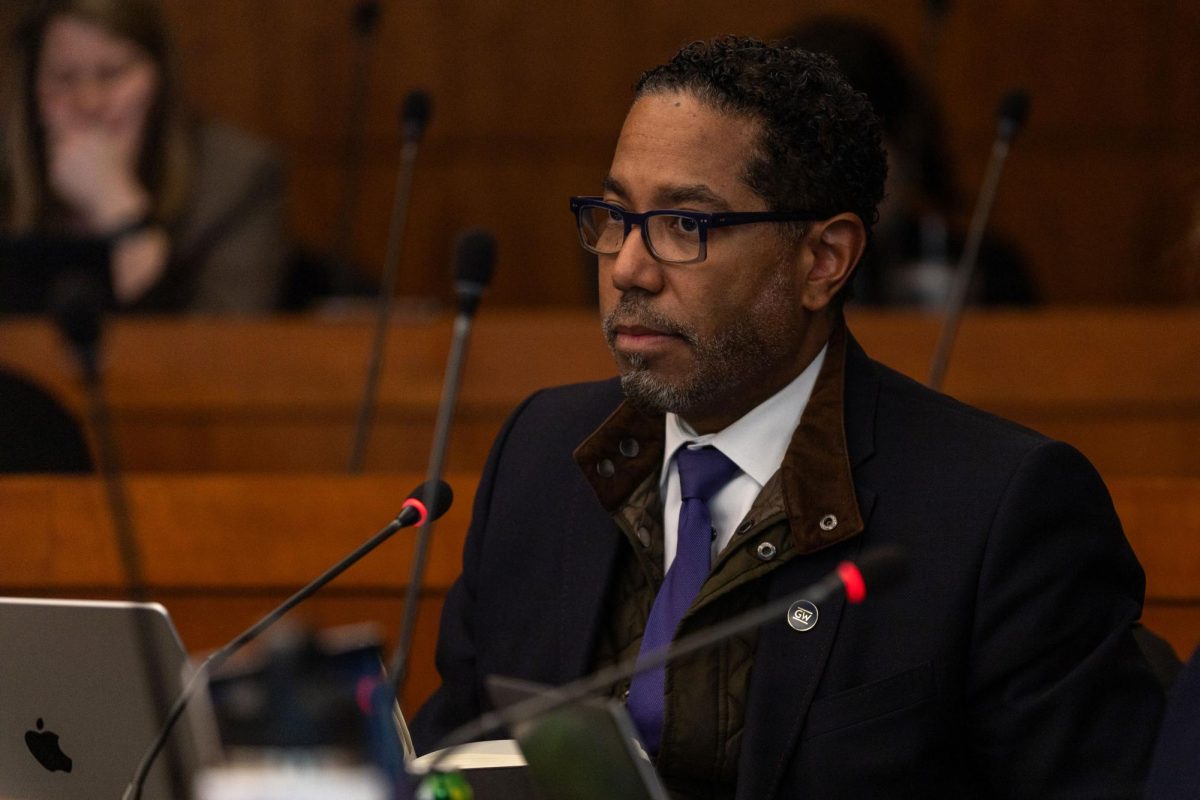Updated: March 25, 2024, at 4:50 p.m.
Officials fell short of meeting a Faculty Code clause requiring 75 percent of regular faculty to be tenured or on a tenure track for the fifth-consecutive year.
The percentage of regular faculty who were tenured or on a tenure track dropped steadily over the past decade — from 77.8 percent in 2014 to 71.5 percent in 2023 — and has remained below 75 percent since 2018, according to the University’s annual core indicators report presented at a Faculty Senate meeting earlier this month. Faculty senators said officials should be more transparent about University finances and consider if their failure to meet the Faculty Code clause for five years indicates that the 75 percent requirement is no longer feasible.
The clause states that no more than 25 percent of regular faculty in any school should be nontenured or not on a tenure track. The code also states that at least half of faculty in all departments should be on a tenure track.
Provost Chris Bracey said personnel headcounts adjust based on “a variety of financial factors,” but the “strategic addition” of tenure-track faculty lines across schools and colleges will remain a “critical consideration” in the University’s fiscal and academic plans and scholarly endeavors.
Bracey declined to say whether officials expect to see the percentage of tenure and tenure-track faculty increase in 2024. He also declined to comment on whether officials are considering amending the Faculty Code clause, considering the University’s failure to comply with the requirement for five years.
“We remain committed to strengthening our scholarly community through attracting and retaining talented tenure-track faculty who will make significant contributions to, and achieve excellence in, our teaching and research missions,” Bracey said in an email.

At the senate meeting earlier this month, Bracey attributed the drop in tenure and tenure-track faculty to the hiring freeze during the COVID-19 pandemic, when officials prioritized contract faculty hires during online learning amid falling student enrollment.
“That decline, as you might imagine, is a function of the pandemic more than anything else, where we actually had a hiring freeze, and then cautious rebuilding post-pandemic,” Bracey said at the meeting.
Murli Gupta, a professor of mathematics and a faculty senator, asked Bracey at the March meeting if officials will allocate more funding for tenure and tenure-track lines in the coming years to meet the “stated policy” outlined in the code.
“Is this trend going to continue or is there some remote possibility that we will reach the 75th percentile of full-time tenure track and tenured faculty anytime in the near future?” Gupta asked at the meeting.
Bracey said funding for tenured positions comes from the University’s “permanent resource base,” which will grow as enrollment increases. He said the Board of Trustees approves tenure-track searches.
“As we expand enrollments, we will then be in a position to do more investment on the faculty side,” Bracey said at the meeting.
Bracey declined to comment on what the “permanent resource base” consists of, or how it is affected by enrollment.
About two years ago, Bracey said he was “confident” the percentage of tenure and tenure-track faculty would experience the “beginning of an upward trend” in the coming year after officials failed to meet the 75 percent requirement for the third-straight year. He said in summer 2021 that officials approved 44 new tenure-track searches to help reach the 75 percent minimum.
Bracey declined to comment on how many tenure-track positions officials filled from the 44 searches, and if the Board approved additional searches since summer 2021.
Faculty senators said officials should consider what percentage of tenure and tenure-track faculty makes fiscal sense for the University and communicate funding concerns with departments.
David Rain, a faculty senator and the chair of the geography department, said he would like to see more funding allocated to tenure and tenure-track lines to help support “strained” departments and programs. He said trustees should work with the administration and faculty under the principle of shared governance to address budgetary concerns.
Faculty senators and trustees approved a set of shared governance principles in spring 2022 that state that faculty should have a role in “key decision making.” In May 2023 senators submitted a resolution to clarify faculty’s role in University decisions after the Board announced plans to arm some GW Police Department officers without notifying the entire senate.
“As a senator, I speak for my faculty when we call for transparency about finances from the administration — especially as we go into the process of developing a new strategic plan,” Rain said in an email.
University President Ellen Granberg began work on a University-wide strategic plan in February with a series of virtual discussions on GW’s future with community members. In May, trustees will begin developing a formal strategic framework for fall 2024.
Rain said more tenured and tenure-track faculty in the geography department would reduce waitlists for popular classes and grant students more access to upper-level courses that currently only accept seniors due to staffing shortages. He said an environmental science faculty member left the department two years ago and has not been replaced despite more than 50 students now studying Environmental and Sustainability Science.
Rain said more tenured and tenure-track faculty would help build “institutional memory” in departments.
“An academic department or program without tenured (or tenure-track) positions would seem to me to be more like a commercial enterprise (though of course many programs operate just fine without tenured positions, so it depends),” Rain said.
Rain said more tenure and tenure-track positions would help faculty prioritize academic freedom because they prevent the risk of being fired over criticism directed toward the administration.
“Tenure also provides continuity to academic departments,” Rain said. “It is the cornerstone of academic freedom, allowing scholars to speak and write the truth without fear of being let go by the administration for saying or writing something controversial.”
Donald Parsons, a tenured professor of economics and a faculty senator, said officials may be reducing funding for tenure and tenure-track positions to address other University priorities, like students’ well-being. He said the 75 percent requirement may be too high given available funding, but he is worried the administration has not determined the appropriate ratio.
“I’d be surprised if 75 percent were quite right,” Parsons said. “But I would be unhappy if we didn’t look hard first and study it and decide what is good.”
Parsons said a rise in young faculty who are “specialists” in parts of their field allows the University to staff high-level courses with faculty who are not tenured. He said in the economics department, officials hire specialized faculty to teach introductory, intermediate and pro-seminar courses because they are qualified and “cheaper” than a tenured faculty member.
“There has been a creeping up of specialists at the lower prices,” Parsons said.
Parsons said tenure-track positions are valuable to the University because tenured professors conduct research that helps institutions rise in rankings and attract new faculty and students.
“In terms of reputation, capital of the University, what builds it is largely that research tenure,” Parsons said.
This post has been updated to clarify the following:
The Hatchet updated this post to clarify that Rain said tenure positions prevent the risk of being fired over criticism directed toward the administration.





